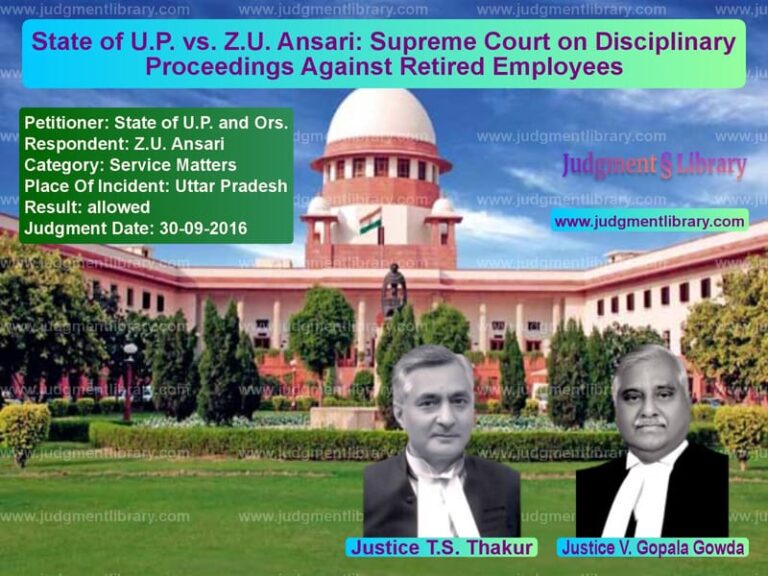Supreme Court Ruling on Deduction of Expenses for Tax-Free Dividend Income: Godrej & Boyce vs. Dy. Commissioner of Income Tax
The Supreme Court’s ruling in Godrej & Boyce Manufacturing Company Ltd. vs. Deputy Commissioner of Income Tax is a landmark judgment on the disallowance of expenses incurred in earning tax-free dividend income under Section 14A of the Income Tax Act, 1961. This case clarifies the applicability of expenditure disallowance and the computation of expenses for income that does not form part of total income.
Background of the Case
The appellant, Godrej & Boyce Manufacturing Company Ltd., incorporated in 1932, is engaged in the manufacture of steel furniture, security equipment, typewriters, electrical appliances, and other related products. It is also a promoter of various other companies and invests in them to maintain control.
The case arose from the company’s tax filing for the Assessment Year 2002-2003. The issue at hand was whether the company could claim deductions for expenses incurred in earning dividend income, which was exempt from taxation under Section 10(33) of the Income Tax Act.
For this assessment year, the company:
- Declared a total loss of Rs. 45.90 crores.
- Showed dividend income of Rs. 34.34 crores.
- Claimed that the majority of its investments were made in its own group companies, with no fresh investments during the assessment year.
Legal Issues Involved
1. Applicability of Section 14A
Whether expenses incurred in earning dividend income, which is not included in total income, could be disallowed under Section 14A of the Act.
2. Retrospective Application of Rule 8D
Whether the newly introduced Rule 8D of the Income Tax Rules, which prescribes a formula for determining disallowed expenses, could be applied retrospectively.
3. Nexus Between Borrowed Funds and Investments
Whether the company had used borrowed funds to earn the tax-free dividend income and, if so, whether the proportionate interest expense should be disallowed.
Arguments Presented
Petitioner’s (Godrej & Boyce) Arguments
- Since tax on dividends was already paid by the dividend-distributing companies under Section 115-O, the dividend income should not be considered “tax-free” for the purpose of disallowing expenses.
- The company had ample interest-free reserves (Rs. 280.64 crores) to make investments, meaning no borrowed funds were used.
- Disallowing expenses on a notional basis violated settled principles of taxation.
Respondent’s (Income Tax Department) Arguments
- Section 14A explicitly states that no deduction shall be allowed for expenses related to tax-exempt income.
- Even if the tax on dividends was paid by the distributing company, the recipient company (Godrej & Boyce) did not pay tax on it.
- Since the company had borrowed funds and invested in shares, a proportionate disallowance of interest expenditure was justified.
Supreme Court’s Observations
The Supreme Court carefully analyzed the provisions of the Income Tax Act and prior rulings. It made the following key observations:
- Section 14A clearly applies to any income not includible in total income.
- The fact that tax was paid by the dividend-distributing company does not change the tax-exempt status of dividend income under Section 10(33).
- The rule of consistency requires that tax treatment should not change unless there is a compelling reason, which was absent in this case.
- Rule 8D, which prescribes a formula for disallowance, cannot be applied retrospectively for the assessment year 2002-03.
- The Assessing Officer must establish a clear nexus between the borrowed funds and the investments before disallowing expenses.
Key Verbal Arguments by the Court
The Supreme Court made the following explicit observations:
“A plain reading of Section 14A would go to show that the income must not be includible in the total income of the assessee. Once the said condition is satisfied, the expenditure incurred in earning the said income cannot be allowed to be deducted.”
“The reliance placed by the assessee on K.P. Varghese vs. Income-Tax Officer (1981) does not assist the assessee in understanding the provisions of Section 14A in the manner indicated.”
“We do not find any mention of the reasons which had prevailed upon the Assessing Officer to hold that the claims of the assessee that no expenditure was incurred to earn the dividend income cannot be accepted.”
Final Judgment
The Supreme Court ruled:
- Section 14A applies to dividend income, even when tax is paid by the distributing company under Section 115-O.
- Rule 8D cannot be applied retrospectively for the assessment year 2002-03.
- The Assessing Officer must provide clear justification before disallowing expenses.
- The appeal by Godrej & Boyce was partially allowed.
Significance of the Judgment
This ruling has significant implications for companies receiving dividend income:
- It reinforces that Section 14A applies even when the tax on dividends is paid by the distributing company.
- It prevents the retrospective application of tax rules.
- It requires tax authorities to justify disallowances with evidence.
Conclusion
The Supreme Court’s judgment in Godrej & Boyce vs. Dy. Commissioner of Income Tax clarifies the interpretation of Section 14A and reinforces the importance of clear tax assessments. This decision provides clarity to companies on how expenses related to tax-free income should be treated.
Don’t miss out on the full details! Download the complete judgment in PDF format below and gain valuable insights instantly!
Download Judgment: Godrej & Boyce Manuf vs Deputy Commissioner Supreme Court of India Judgment Dated 08-05-2017.pdf
Direct Downlaod Judgment: Direct downlaod this Judgment
See all petitions in Income Tax Disputes
See all petitions in Tax Evasion Cases
See all petitions in Tax Refund Disputes
See all petitions in Judgment by Ranjan Gogoi
See all petitions in Judgment by Ashok Bhushan
See all petitions in partially allowed
See all petitions in supreme court of India judgments May 2017
See all petitions in 2017 judgments
See all posts in Taxation and Financial Cases Category
See all allowed petitions in Taxation and Financial Cases Category
See all Dismissed petitions in Taxation and Financial Cases Category
See all partially allowed petitions in Taxation and Financial Cases Category







